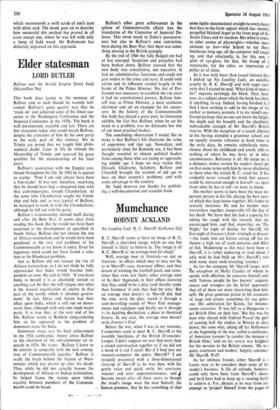Elder statesman
LORD BUTLER
This book does justice to the memory of Balfour and as such should be warmly wel- comed. Balfour's great quality was that he `stuck on' and achieved some of his finest suc- cesses at the Washington Conference and the Imperial Conference in the 1920s. The book is well documented, readable and fair. There are few statesmen today who could match Balfour, despite the criticisms of him by his own party in the early part of this century. We in Trinity are proud that we taught him philo- sophical doubt. Later in life he refused the Mastership of Trinity and reserved his great qualities for the statesmanship of his later years.
Balfour's association with the Empire con- tinued throughout his life. In 1903 he is quoted as saying: 'Now I am and always have been a free-trader.' It was not, therefore, surprising that he should have had a chequered time with that arch-imperialist, Joseph Chamberlain. At the same time Chamberlain sought his friend- ship and help and, as was typical of Balfour, he managed to work in with the Chamberlains, although he fell out with his party.
Balfour's statesmanship showed itself during and after the Boer War. It seems clear from reading this book that he would not have been surprised at the development of apartheid in South Africa. Balfour did not foresee the rise of African nationalism and he would have been perplexed at the very real problems of the Commonwealth as we know it today. Even his ingenious mind could not have found a solu- tion to the Rhodesian problem.
Just as Balfour did not foresee the rise of African nationalism, so I do not think he fully appreciated that India would become inde- pendent so soon. He said in 1924: 'If you leave India to herself it is as absolutely certain as anything can be that she will relapse into what is the natural organisation of society in that part of the world, which is absolute govern- ment.' In fact, Dicey and Anson had their effect upon India, which is still run on demo- cratic lines, although with only one single major party. It is true that, at the very end of his life, Balfour wrote to Baldwin congratulating him on his approach to the problem of dominion status for India.
Dominion status was his final achievement in the 1926 conference. Amery chose Balfour as the chairman of the sub-committee on re- search in 1926. He states: `Balfour I knew to be entirely in sympathy with the new concep- tion of Commonwealth equality.' Balfour is really the brain behind the Statute of West- minster which was drawn up after his death. Thus, while he did not actually foresee the development of African or Indian nationalism, he helped frame the statute upon which equality between members of the Common- wealth could be based.
Balfour's other great achievement in the sphere of Commonwealth affairs was the foundation of the Commitee of Imperial De- fence. This owed much to Esher's persuasive- ness but also to Balfour's own conviction; born during the Boer War, that there was some- thing missing in the British panoply.
By the end of 1904 the fully fledged cm had at last emerged. Suspicion and prejudice had been broken down. Balfour stressed that the new body was consultative, not executive. It had no administrative functions and could not give orders to the army and navy. It could only advise and its influence resided largely in the hands of the Prime Minister. No Act of Par- liament was necessary to establish the cm since it had no constitutional powers. Balfour him- self was, as Prime Minister, a most assiduous chairman and set an example for his succes- sors. In the history of the Commonwealth this body has played a great part; its formation exhibits the fact that Balfour, when he set his mind to a problem, was no dilettante but one of our most practical leaders.
The concluding observation I would like to make is that Balfour's life illustrates the value of experience and ripe age. Nowadays, and particularly since the Kennedy era, it has been thought essential to choose political leaders from among those who are young or approach- ing middle age. I hope we may realise that Disraeli, Gladstone, Salisbury, Balfour and Churchill brought the wisdom of old age to bear on their country's problems, and with some advantage to the country.
Mr Judd deserves our thanks for publish- ing a well-documented and readable book.


































 Previous page
Previous page